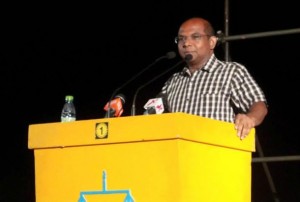Chief Justice Ahmed Faiz has accused the international community of fabricating lies regarding the Supreme Court’s verdict against the Elections Commission (EC).
In doing so, “they have engaged in a battle against the constitution with an independent nation”, said Faiz.
The Chief Justice released a statement strongly condemning statements released by the US State Department and the Canadian Ministry of Foreign Affairs on Tuesday.
These voices of disapproval were joined today by Australia, which has similarly expressed concern over recent developments, noting its “firm expectation” that scheduled elections will go ahead “in a manner that is free, fair, credible and peaceful”.
In his response to such comments, Faiz claimed that neither international countries nor organisations have the authority to criticise and spread falsifications regarding any verdict of the Supreme Court.
Claims by the international community that the apex court is unduly influencing the work of the EC and undermining their independence is against the truth, argued the chief justice.
“I would like to say that these statements regarding a Supreme Court verdict in an internal legal case of the Maldives are inclusive of falsified claims, and undermine the respect and authority of the Maldivian judiciary,” said Faiz.
“They are thus an irresponsible act by the international community, one conducted without observing the events occurring in the Maldives or getting clarifications of the matter from local authorities. I thereby strongly condemn these statements,” the statement read.
“The Maldives is a free and independent state. It is a sovereign state which rules over itself. The releasing of falsified accounts and statements of the Maldives’ Supreme Court’s actions to fulfill its legal obligations is neither an assistance towards consolidating democracy in the Maldives nor towards maintaining rule of law or strengthening of the justice system.”
Faiz emphasized that he would continue to fulfill his legal obligations concerning the mandates of the courts, and that he would do so without any hesitation towards or consideration of international opinion.
Challenging the Supreme Court
Faiz also condemned local groups’ criticism of the verdict. The Maldivian Democratic Party and the Majlis secretariat have both deemed the ruling unconstitutional.
Faiz stated that the most important duty of the apex court is to establish justice, rule of law and to maintain the empowerment of law, and the constitution requires that the Supreme Court has the final say in the interpretation of laws.
He further noted that it was the constitutional responsibility of all state authorities to maintain the respect and positive reputation of the courts.
“While this is so, when the few persons in charge of running the matters of the state repeatedly challenged the verdicts of the Supreme Court and undermined the respect towards the courts, it was an act that certainly eroded people’s trust in one branch of the state and an act that paved the way to the obliteration of the foundation of the Supreme Court,” Faiz continued.
“There is no doubt that the failure to take action against such acts – despite them becoming alarmingly common – negatively affects the Constitution of the Maldives and casts a shadow over the courts of law.”
“It is an incontestable reality that it is a danger to our constitution when there are matters in the judiciary which need to be reformed through the joint efforts of all state authorities, and instead of constructive work to achieve this, the courts are challenged and the judiciary is attacked.”
Faiz concluded the statement asserting that he will continue to work according to his mandate regardless of the criticism that comes his way, and without any hesitation despite any criticisms or obstacles that may be put forth by international organisations and foreign countries.
 (0)Dislikes
(0)Dislikes (0)
(0)
